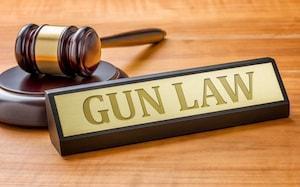When Can I Face Criminal Charges for Carrying a Gun in Texas?

The right to bear arms has been a hot topic for years. This is a direct result of mass shootings that have taken place across the country. While many people advocate for the banning of firearms, the Second Amendment protects American citizens’ right to keep and bear arms. The state of Texas has strict gun laws to mitigate the number of gun-related crimes while still allowing its citizens to own a gun if they meet the requirements.
Texas Laws Explained
Texas is a “shall-issue” state. This means that as long as applicants pass the basic state law requirements, the issuing authority cannot deny applicants a permit if they would like one. Texas is not alone. 41 of the 50 U.S. states are classified as shall-issue. Those who would like to "open carry" are required to obtain a Texas License to Carry (LTC) or a concealed carry license/permit from a state with reciprocity. The same licenses/permits are required to legally carry a concealed gun; however, additional training and exams must also be completed. Both open carry and concealed carry require an individual to be 21 years old, or 18 years old if they are a member of the military.
How Can I Get an LTC License?
LTC licenses cost $40 and need to be renewed every five years. There is a long list of qualifications, most of which ban gun possession by anyone with a criminal record. Applicants must attend four to six hours of in-class training and pass a written test and shooting demonstration. Those applicants who complete the training will receive a certificate to submit with their application.
Can I Still Get in Trouble With a License?
The situation that places most people in hot water is carrying a gun in locations that are considered off-limits. There are many spots where guns are not allowed, regardless of the carrier’s licensing status. Remembering this long list of locations can help you avoid making an inadvertent mistake. It is illegal to carry a firearm in the following places:
-
On the premises of a business that receives at least 51% of its income from selling or serving alcohol for on-premises consumption
-
A college or university campus
-
Grounds where a high school, college, or professional competition is taking place, including sporting or scholastic events
-
On the premises of a hospital or nursing home
-
At an amusement park
-
On the premises of a church, temple, synagogue, or any place of worship
-
At a meeting of a government entity
-
On the premises of a government court building
-
On the premises of a jail or correctional facility
-
Within 1,000 feet of anywhere the Texas Department of Criminal Justice designates as a place of execution on a date that an execution is scheduled
-
On the premises of a private or public employer, excluding the parking lot (if posted)
-
Any place if you are intoxicated
-
Any place if the handgun is unholstered and in plain view
-
Any place if you are a member of a street gang
-
Any place while you are engaged in an unlawful activity
-
At a polling place on the day of an election
-
On the premises of a racetrack
-
In a secure area of an airport
-
Any location where federal laws, state laws, or other regulations prohibit the carrying of firearms
Contact a Plano, TX Weapons Charge Defense Lawyer
Gun charges are taken very seriously in the state of Texas due to the high volume of tragic incidents that have spanned the country over the past decade. There are various gun and firearm offense charges, and unlawful possession is common throughout the state. At The Crowder Law Firm, P.C., we have successfully defended people facing numerous different criminal offenses for over two decades. If you have been accused of a gun and firearm offense, contact our experienced Collin County gun crime defense attorneys at 214-544-0061 for a free consultation.
Sources:
https://www.gunstocarry.com/gun-laws-state/texas-gun-laws/
https://www.usconcealedcarry.com/resources/ccw_reciprocity_map/tx-gun-laws/
https://www.usconcealedcarry.com/resources/terminology/types-of-concealed-carry-licensurepermitting-policies/shall-issue/

















